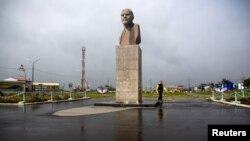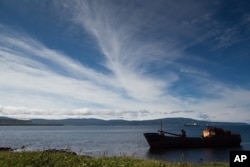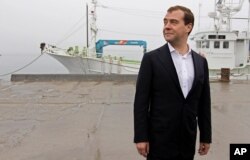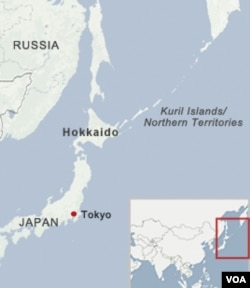Russia’s plan to build a military base on the disputed Kuril Islands, that were seized from Japan at the end of World War II, is a small part of Moscow’s own “Asia pivot” to increase and protect trade with the vibrant economies in the Pacific region.
“If Russia really wants to be a player militarily in Northeast Asia, the military presence in the Kurils is very helpful,” said security analyst Grant Newsham, with the Forum for Strategic Studies in Tokyo.
The United States has used the term “Asia pivot” to describe President Barack Obama’s efforts to place greater strategic importance on this region to counter China’s growing military presence and economic strength.
Kuril Islands base
Russian Defense Minister Sergei Shoigu’s announcement to build a base on the Kuril Islands along with four Arctic bases is part of President Vladimir Putin’s plan to build up his country’s military presence in the region.
Russia has reportedly increased spending by over $600 billion in the last decade to modernize its military that includes deploying new nuclear submarines, jets and helicopters.
Russia’s Pacific Fleet currently consists of 73 vessels, including 23 submarines and 50 warships.
Moscow is also developing closer ties to Beijing. The two militaries recently conducted a joint naval exercise that the Russian state news agency TASS described as the largest “in the modern history of cooperation” between Russia and China.
While locating a military base on the Kuril chain of islands near key shipping lanes connecting Russia to the Pacific has some strategic value, Newsham said other factors like national pride and the political projection of power also play a part.
Potential reserves
In addition the potential of offshore reserves of oil and gas, as well as rich fishing grounds has increased the value of the islands.
Building a Russian military base on the Kurils will likely further undermine relations with Tokyo, which lays claim to the southern islands in the chain, known in Japan as the Northern Territories.
The Soviet Union seized the islands in 1945, shortly before Japan's surrender in World War II, and expelled the 17,000 Japanese residents living on the islands. The two countries have been unable to agree on a post-war peace treaty because of the ongoing dispute over ownership of the islands.
In August, Tokyo protested when Russian Prime Minister Dmitry Medvedev visited the disputed islands of Kunashir and Iturup near Hokkaido, Japan's northernmost island, where Russia is said to be building two military garrisons.
Japanese officials reacted with caution to last week’s announcement by the Russian defense minister.
"We've yet to figure out the context of this remark, but if the plan is true, the Japanese government will strongly protest it as we are unchanged in our stance that the islands are Japanese sovereign territories," said Japan's Chief Cabinet Secretary Yoshihide Suga.
Diplomatic resolution
There was some hope that the Kremlin and Japanese Prime Minister Shinzo Abe’s administration would be able to find a diplomatic resolution to this contentious issue.
Both sides could economically benefit from increased trade. And Japan could be a lucrative market for Russia's vast oil and natural gas supplies.
Japan however rejected a past Russian offer to return only the two smallest islands in the chain.
Abe’s visit to Ukraine earlier this year and Tokyo’s support for U.S. led sanctions against Moscow for its support of separatists in Eastern Ukraine has also reportedly hardened Putin's position.
“There is really not much Japan can do and I don’t think there ever has been much that they can do. Russia seems to have the better hand,” Newsham said.
Earlier this month Putin postponed indefinitely a visit to Japan due to the dispute over the Kuril Islands.








